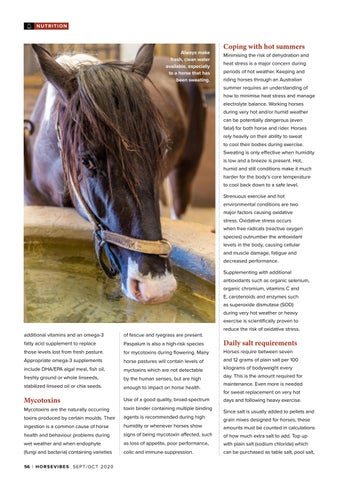NUTRITION
Always make fresh, clean water available, especially to a horse that has been sweating.
Coping with hot summers
Minimising the risk of dehydration and heat stress is a major concern during periods of hot weather. Keeping and riding horses through an Australian summer requires an understanding of how to minimise heat stress and manage electrolyte balance. Working horses during very hot and/or humid weather can be potentially dangerous (even fatal) for both horse and rider. Horses rely heavily on their ability to sweat to cool their bodies during exercise. Sweating is only effective when humidity is low and a breeze is present. Hot, humid and still conditions make it much harder for the body’s core temperature to cool back down to a safe level. Strenuous exercise and hot environmental conditions are two major factors causing oxidative stress. Oxidative stress occurs when free radicals (reactive oxygen species) outnumber the antioxidant levels in the body, causing cellular and muscle damage, fatigue and decreased performance. Supplementing with additional antioxidants such as organic selenium, organic chromium, vitamins C and E, carotenoids and enzymes such as superoxide dismutase (SOD) during very hot weather or heavy exercise is scientifically proven to reduce the risk of oxidative stress.
additional vitamins and an omega-3
of fescue and ryegrass are present.
fatty acid supplement to replace
Paspalum is also a high-risk species
those levels lost from fresh pasture.
for mycotoxins during flowering. Many
Horses require between seven
Appropriate omega-3 supplements
horse pastures will contain levels of
and 12 grams of plain salt per 100
include DHA/EPA algal meal, fish oil,
myctoxins which are not detectable
freshly ground or whole linseeds,
by the human senses, but are high
stabilized linseed oil or chia seeds.
enough to impact on horse health.
Mycotoxins
Use of a good quality, broad-spectrum
Daily salt requirements kilograms of bodyweight every day. This is the amount required for maintenance. Even more is needed for sweat replacement on very hot days and following heavy exercise.
Mycotoxins are the naturally occurring
toxin binder containing multiple binding
toxins produced by certain moulds. Their
agents is recommended during high
ingestion is a common cause of horse
humidity or whenever horses show
health and behaviour problems during
signs of being mycotoxin affected, such
wet weather and when endophyte
as loss of appetite, poor performance,
with plain salt (sodium chloride) which
(fungi and bacteria) containing varieties
colic and immune-suppression.
can be purchased as table salt, pool salt,
56 | H O R S E V I B E S S E P T / O C T 2 0 2 0
Since salt is usually added to pellets and grain mixes designed for horses, these amounts must be counted in calculations of how much extra salt to add. Top up

























